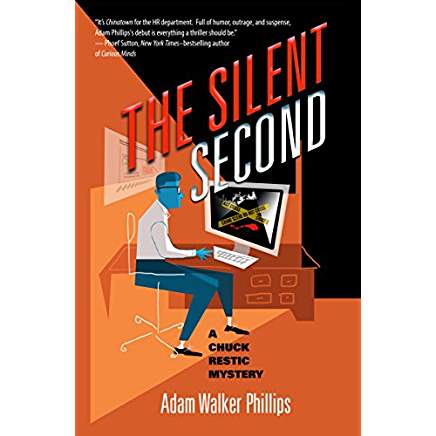Chuck Restic is a human relations manager in a large firm in La La Land. HIs career peaked years ago and while his star descends that of his wife, a property lawyer, ascends and they part company without acrimony.

Now Chuck has time on his hands and the hum-dum of the office offers little distraction. In response to a complaint from a employee he talks to Ed about his cologne. Yes, about his cologne. An explanation is below. Chuck finds Ed a nice fellow.
A few weeks later quite by accident Chuck learns that Ed disappeared shortly after that interview. Time passes and Ed does not return. After four weeks AWOL the corporate policy is to clear Ed’s cubicle, box the contents, and mail it collect to the listed address. He is sent down the Corporate Memory Hole.
Chuck decides to pass some time by taking the box to the address by hand. In so doing he is gradually drawn into a real estate swindle in which Ed himself was somehow involved. But when Ed’s body is found, it gets worse.
There are some very tough guys around who fancy themselves to be the Armenian Mafia, Lincoln Heights Branch. They may be tough but the smart money is played by a zillionaire who is pulling all the strings.
Along the way, Chuck finds solace with a police officer who throws herself at him, a fact he accepts as his lot. Too bad he had not seen ‘Funeral in Berlin’ (1966) where Harry Palmer realises immediately that Eva Renzi is up to no good when she throws herself at him. Poor Chuck.
Chuck is bored at work and idle at home so he starts nosing around and gets in deeper and deeper. Then one of his buddies is murdered and the plot gets thicker quicker. While I remembered Harry Palmer’s self-deprecating cynicism and saw the punch coming, it is played out very well.
There are technical details about Lost Angeles real estate that provide much of the mystery, and while the Armenians are much in evidence, they know there are bigger fish in this sea. Chuck doesn’t and keeps stumbling around.
But after a thirty year career of insufferable Power Point presentations, unending off-site retreats, excruciating 360 degree reviews, maniacal KPIs, and nightmarish McKinsey-speak, being beaten up by Armenians comes as something of a relief to Chuck. Still all those years in HR gives him access to a lot of personal information about personnel past and present and even applicants that he puts to use. Futhermore, it has taught him how to read between the lines in files to find out more. He also has contacts among freelance journalists who in the past have dug out information for him; in short, there is a solid base for his investigations.
As to the cologne, this is the story. An employee lodged a formal complaint against Ed for wearing so much cologne that she became ill. Mind, Ed did not work near her cell, er cubicle, but only walked by it once or twice a day. Still she filed the paperwork, and once filed it fell to Chuck to deal with it. It all seemed so realistic.
The complaint was vexatious. The complainer had been with the firm less than two years, during which time seven formal complaints about comparable matters had been filed, while the complained did little productive work. But the complainer, once hired, was untouchable, being a forty plus, pregnant, black woman who ticked all the demographic boxes for a huge personal injury suit from giant uncaring oppressive corporation that had made mistaken of hiring her. She had to be placated at all costs. Ed, on the other hand, had been with the firm for more than a decade, was extremely productive, corporate loyal, but as a white, middle-aged man he would never win a lawsuit. Such is the corporate logic in these pages.
 Adam Phillips
Adam Phillips
While the plot is straight out of Raymond Chandler with updates and located in the world of real estate, the corporate backdrop strikes a cord with this reader. The author produces an interesting variety of characters and gives each a distinctive voice. There is much travelogue of the Lost Angeles where people live and work well away from the Tinsel Town stereotypes. The corporate world and the real estate context are refreshing. This is the first of a series and I look forward to reading another.
Skip to content
